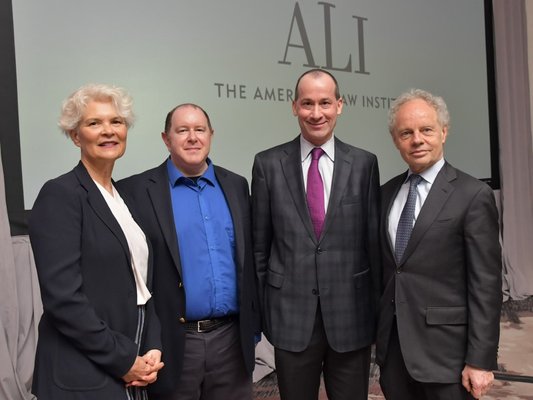ALI Approves Principles of the Law, Data Privacy

PHILADELPHIA: At today’s 96th Annual Meeting, members of The American Law Institute voted to approve the Tentative Draft of Principles of the Law, Data Privacy. Today’s vote marks the completion of this project.
The Principles seek to provide a set of best practices for entities that collect and control data concerning individuals and guidance for a variety of parties at the federal, state, and local levels, including legislators, attorneys general, and administrative agency officials.
“Information privacy law concerns the collection, use, and disclosure of personal information,” said ALI Director Richard L. Revesz. “Entities that collect such information are subject to a cacophony of different statutes and regulations that lack conceptual harmony. We hope that the recommendations in this Principles of the Law project will be helpful to these entities.”
The project launched in 2013 and is led by Reporters Paul M. Schwartz of the University of California, Berkeley School of Law, and Daniel J. Solove of George Washington University Law School.
“The ALI process is something that is humbling because you get so much useful feedback, and the end-product is far superior to anything that we could have done on our own,” said Reporter Paul Schwartz. “We had Advisers from legal departments of some of the largest U.S. corporations, as well as lawyers in private practice, judges, and academics in the room. Having these many talented, insightful people going over a document line by line, comma by comma, was an amazing experience, and produced an incredible piece of work.”
“The project presents a framework to effectively implement privacy protection,” added Reporter Daniel J. Solove. “One of the foundational things about privacy protection is the Fair Information Practice Principles or FIPPs. What you’ll find is that there are many different versions of FIPPs. One of the things we tried to do is pull together all these different versions and come up with what we think is the most sensible approach.”
The project is divided into three Chapters: 1. Purpose, Scope, and Definitions; 2. Data Privacy Principles; and 3. Accountability and Enforcement. The Principles that are included cover a wide variety of topics that are the forefront of privacy law today, from consent and confidentiality to data portability, retention, and destruction.
“I think this subject will continue to be one that’s central to policy and politics and our lives,” said Professor Schwartz. “We now live in a world in which our refrigerators communicate with the internet. All types of new devices are wired. They phone home. They track us and collect information about us, and this is very valuable information. It’s also information that in the wrong hands can lead to privacy violations.”
With the approval of the draft, the Reporters will now prepare the Institute’s official text for publication. Until the official text is published, this Tentative Draft approved by ALI’s Council and membership is the official position of ALI, and may be cited as such.
* * *
About The American Law Institute
The American Law Institute is the leading independent organization in the United States producing scholarly work to clarify, modernize, and improve the law. The ALI drafts, discusses, revises, and publishes Restatements of the Law, Model Codes, and Principles of Law that are enormously influential in the courts and legislatures, as well as in legal scholarship and education.
By participating in the Institute’s work, its distinguished members have the opportunity to influence the development of the law in both existing and emerging areas, to work with other eminent lawyers, judges, and academics, to give back to a profession to which they are deeply dedicated, and to contribute to the public good.
For more information about The American Law Institute, visit www.ali.org.
